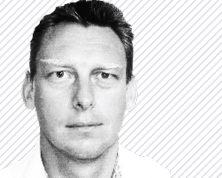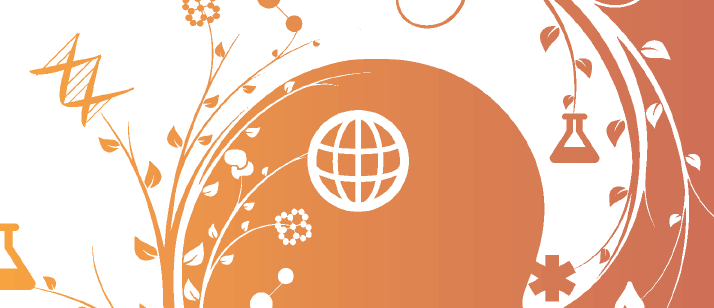As group leader of spectroscopy and process analysis with AkzoNobel, Oscar van den Brink observed that innovation and human capital were both crucial for success. Earlier in his career as PhD student and coordinator of a European research project at the FOM Institute for Atomic and Molecular Physics, where he combined novel mass spectrometric techniques with the research of works of art, Oscar noticed that the range of application areas that benefit from analytical science is very broad. Since late 2010, as managing director of COAST, he has been executing COAST’s integrated strategic agenda of research, education and infrastructure. “I am very happy to now be in the position, together with my two co-directors, to enhance collaboration in analytical science among companies and knowledge institutes in many application areas.”


In early 2008, a group of Dutch analytical lab managers and academics were sitting together bemoaning the lack of human capital in analytical science. We all felt that if something wasn’t done, the situation would get even worse but that if we simply shouted, “Help!” no one would respond. “Which of us is willing to take action?” we asked each other. Eight people – myself included – raised their hands, and went on to form the interim board of what is now COAST: Comprehensive Analytical Science and Technology. We board members committed to getting things off the ground and the group as a whole pledged support. The 30 or so people in the room, representing academic groups and companies, all agreed to donate a few thousand Euros.
Three root concerns were identified. First, the difficulties that were being experienced in recruiting high quality researchers and technicians. Second, a trend towards application-driven and sector-specific analytical R&D at Dutch universities, with a concomitant decline in innovative fundamental research. And third, the limited sharing of and access to rare, high-end analytical instrumentation. In all of these respects our comprehensive partnership aims at having the widest possible influence by covering the full width of the discipline, from sampling to interpretation and from bulk chemical characterization to single molecule mapping, while serving multiple application areas. Today, COAST still comprises these three main pillars: human capital, research and development, and infrastructure. The roof over the pillars is valorization – the conversion of knowledge into capital – which is hugely important for real progress. Here are examples of the multiple projects that we have in each category:
Research labs, particularly in industry, employ a large percentage of people with an applied science background. Our Analytical Sciences Talent Programme (ASTP) stimulates the development of talent amongst students in vocational education at universities of applied science. We link students up with participating companies to give them industry experience alongside their regular education. All candidates undergo a thorough selection process; they need good first year grades, a letter of support from the director of their university, and they must show enthusiasm and a willingness to work 400 hours per year at the company. Once on the program, students must also attend an extra 150 hours of ASTP lectures given by professors from academic universities and application scientists in industry. In exchange, we provide them with a grant – they certainly don’t have time for a part-time job pulling beers. Participating companies have found it to be a successful recruitment mechanism. ASTP is something we are very proud of; Peter Schoenmakers, our education director, has worked very hard to realize it (see The High-Impact Chromatographer).
TA COAST (TA stands for technology area) brings academia and industry together to dig deeper and make step changes in analytical science. The key is linking together analytical science experts from different application areas. For example, participants from chemistry, food, and life science areas may collaborate together on a project to develop an affordable lightweight mass spectrometer or NMR techniques to study polymers under processing. To date, TA COAST has provided grants totalling 9 million Euros to support nine projects, that range from four to fourteen partners. Twenty-four private partners, including 10 SMEs, and 17 academic groups are involved. COAST, as a foundation, takes no intellectual property (IP) rights from the projects supported. Project participants negotiate on IP, sharing the success. When several application areas join forces and gather interests, a more fundamental description of their analytical needs is generated, which allows research to dig deeper. In reality, that means working on a solution that is closer to basic innovation. Collaborative approaches help spread the risks and efforts required; it’s a more business-based approach to research and development. Indeed, our research programs attempt to facilitate a better balance between the chance of success (or risk) and the magnitude of investment. Without such collaborative efforts in the current economic climate, conducting comprehensive analytical research would be much more difficult.
There are many unique and/or rare analytical facilities in The Netherlands. COAST facilitates access to both techniques and instrumentation, from the latest high-end LCxLC set-up to something very specialized, such as Willem van Raalte’s interface for the analysis of oily residues (It’s All About the Residue). If you want to perform oily residue analysis only once or twice, why not do it in Willem’s lab? That way, immediate capital investment is unnecessary. Of course, Willem may charge for the service, but he also has an interest in your success. At the more expensive end of the spectrum, COAST provides access to the 850 MHz solid-state NMR facility in Nijmegen and the 900 MHz liquid-state NMR in Utrecht –facilities that you wouldn’t dare suggest to management that you should buy! COAST provides fast access to 49 instruments on our database, each of which provides specific, unique or rare capabilities to the community. A by-product of the database is the creativity it can engender – you may discover something that you didn’t even realize existed.
Could the COAST model be exported to other countries? Certainly it could, and we would be willing to join forces and support similar initiatives to form a global network. However, I believe there are some cultural issues at play; public-private partnerships of this type are perhaps easier in Dutch culture (or Belgian or German) than in some other cultures. As far as I can tell, bilateral agreements are preferred over multilaterals when it comes private partnerships in the US. You could form a community made up of bilaterals, but it would be an inefficient and lengthy process. By the time the initiative reached critical mass, the benefit of multilateral collaborations may become obvious, but that remains to be seen. The reason for COAST’s success is the very fact that two or more private partners get on board with each project. In future, COAST may well look to expand beyond the borders of The Netherlands by being open to companies or institutes who have a strong motivation to link up with us. We interact a lot more internationally nowadays, and this has encouraged a wider perspective and increased the trust necessary for the kinds of partnerships we promote. As communication technology progresses, things can only improve further.
If technical innovation is important for economic growth, the well-being of the population, or the sustainability of the ecosystem of a country or region, then governments must pay attention. On the basis that analysis meets all three of these criteria, we approached the Dutch government for matching funds. In fact, it was this move that prompted the formal establishment of TI COAST (our official title – TI stands for top institute) as a professional organization in December 2008. The government had already defined specific economic areas to be developed using public-private partnerships – the so-called “Topsectoren” (www.top-sectoren.nl). Among them are chemistry, life sciences and health, agro-food, and water. All of these areas are linked to tangible products and, in most cases, analytical science is a crucial success factor in continued technical innovation. And the better you measure, the faster the innovation. We see a parallel to information and communications technology (ICT): without it, you can achieve very little – it is an enabling cross-sector discipline; the same is true of analytical science, though admittedly more modestly so. The essential nature of analytical science is something that COAST highlights to the funding agencies within our government. Until recently, the message did not resonate, but people are starting to wake up as we continue to show that companies within many of the Topsectoren are willing to link up in analytical science research to share the risk, share the investment, and, most importantly, multiply the success.
The government contribution to COAST is all put into research programs; nothing is used for the day-to-day running of the organisation, which is funded by participant fees. That means that if government decides to reduce its commitment, the organization remains sustainable and won’t collapse in on itself. Legally, COAST is a foundation but it is structured like a society or club. It is run by a participant council made up of some 70 companies, universities and knowledge institutes; the strength of their vote depends on what they contribute, with voting values from zero (no contribution) to three – he who pays the piper, calls the tune! The main reasons for participants joining COAST are concerns about the availability of well-trained analytical professionals and interest in innovation within analytical science. The industries and public institutions that use analytical science are of course primarily interested in applications but see the need for investment in basic innovation as well; the academic partners are of course interested in performing research; and the instrument companies may be primarily interested in selling instruments but certainly see the benefits of developing new techniques, methods and applications in collaborations with their customers. These needs and interests are complementary and the reason COAST has been so successful in connecting those disparate stakeholders. I am often asked how “the project” is doing. It is doing very well but COAST is not a project – it is a community. We want people to work together not just in the short term but for many, many years to come. We want to create a community that not only collaborates on research but also recognizes that to do good research, we need good people. And investing in them now will enable even better research in the future. Oscar van den Brink is Managing Director of COAST, Amsterdam, The Netherlands. www.ti-coast.com




